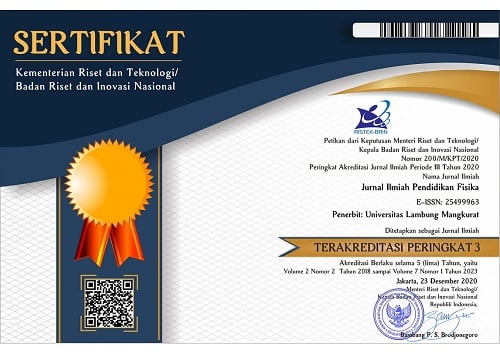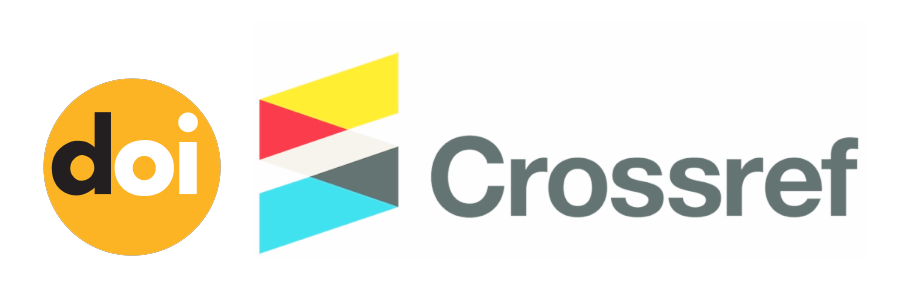Teaching Materials for Dynamic Fluids: An Application of Multimodels to Teach Learners' Problem-solving Ability
Abstract
Students' ability to solve physics problems is still relatively low, which triggers research to apply various learning models to the learning process. This research aims to test the effectiveness of multimodels in dynamic fluid material to train students' problem-solving abilities. This research used a quantitative research method, which is a Pre-experiment Design. The research trial subjects were 27 students in class XI MIPA 3 SMA Negeri 10 Banjarmasin. Data collection techniques were seen from measuring multimodel learning outcomes based on pre-test and post-test results. Meanwhile, data analysis techniques were taken descriptively, quantitatively, and qualitatively. Based on research results, multimodel learning has a medium level of effectiveness, so it can be implemented in the learning process. Therefore, this multimodel learning can be used as an alternative for training students' problem-solving abilities.
Keywords
Full Text:
PDFReferences
Afandi, A., Sajidan, S., Akhyar, M., & Suryani, M. (2019). Development frameworks of the indonesian partnership 21st-century skills standards for prospective science teachers: A delphi study. Jurnal Pendidikan IPA Indonesia (Indonesion Journal of Science Education), 8(1).
Agustina, A., M, A. S., Haryandi, S., Zainuddin, Z., & Dewantara, D. (2022). The effectiveness of multimodel learning on linear motion topics to practice Student’s Problem Solving Skills. Berkala Ilmiah Pendidikan Fisika, 10(3), 294. https://doi.org/10.20527/bipf.v10i3.13842
Amalia, P. I., Abidin, S. F. F., & Safitri, S. R. (2019). Project-based learning in chinese classroom: A way to stimulate students. KnE Social Sciences, 3(10), 77. https://doi.org/10.18502/kss.v3i10.3890
Ariyanti, A. M., Zainuddin, & Dewantara, D. (2022). Development of electronic teaching material containing south kalimantan’s traditional game to improving students’ problem-solving ability. Radiasi : Jurnal Berkala Pendidikan Fisika, 15(2), 60–71.
https://doi.org/10.37729/RADIASI.V15I2.2207
Avry, S., Chanel, G., Bétrancourt, M., & Molinari, G. (2020).
Achievement appraisals, emotions and socio-cognitive processes: How they interplay in collaborative problem-solving? Computers in Human
Behavior, 107, 106267. https://doi.org/10.1016/J.CHB.2020.106267
Azhary, Y., Mastuang, M., & Dewantara, D. (2022). Impulse and momentum linear teaching materials with al-quran verses to practice problem solving skills of students: Practicality and effectiveness. JIPFRI (Jurnal Inovasi Pendidikan Fisika Dan Riset Ilmiah), 6(2), 87–94. https://doi.org/10.30599/JIPFRI.V6I2.1304
Bender, W. N. (2012). Project-based learning: Differentiating instruction for the 21st century. Thousand Oaks.
Burkholder, E. W., Miles, J. K., Layden, T. J., Wang, K. D., Fritz, A. V, & Wieman, C. E. (2020). Template for teaching and assessment of problem solving in introductory physics. Physical Review Physics Education Research, 16(1).
https://doi.org/https://doi.org/10.1103/physrevphyseducres.16.010123
Chiu, B., Randles, C., & Irby, S. (2022). Analyzing student problem-solving with MAtCH. Frontiers in Education, 6(January), 1–14. https://doi.org/10.3389/feduc.2021.769042
Devanti, S. O., Achmadi, H. R., & Prahani, B. K. (2020). profile of students’ problem solving skills and the implementation of structured inquiry models in senior high schools. Berkala Ilmiah Pendidikan Fisika, 8(3), 144–156.
Fahrina, F., Jamal, A., & M, A. S. (2018). Meningkatkan kemampuan analisis sintesis siswa kelas x mia 6 sma negeri 2 banjarmasin melalui model pengajaran langsung dengan metode problem solving. Berkala Ilmiah Pendidikan Fisika, 6(1), 98.
https://doi.org/10.20527/bipf.v6i1.3897
Fautin, S., M, A. S., & Dewantara, D. (2021). Pengembangan bahan ajar fisika berbasis multimodel pada topik teori kinetik gas. Jurnal Ilmiah Pendidikan Fisika, 4(3), 111. https://doi.org/10.20527/jipf.v4i3.2057
Fitriah, L. (2019). Efektivitas buku ajar fisika dasar 1 berintegrasi imtak dan kearifan lokal melalui model pengajaran langsung. Berkala Ilmiah Pendidikan Fisika, 7(2), 82–96. https://doi.org/10.20527/bipf.v7i2.5909
Fitriana, D. A., & Supahar, S. (2019). Developing an assessment instrument of mathematical problem-solving skills in senior high school. International Journal of Trends in …. https://ijtmer.saintispub.com/index.php/ijtmer/article/view/55
Hake, R. (1998). Analyzing change/gain scores. american research association’s division: measurement and research methodology. 5(2).
Hake, R. R. (1998a). Analyzing Change/Gain Score. Departement of Physics Indiana University.
Hake, R. R. (1998b). Interactive-engagement versus traditional methods: a six thousand-student survey of mechanics test data for introductory physics courses. American Journal Physics, 66(1), 64–74.
Han, A., Krieger, F., & Greiff, S. (2023). Assessment of collaborative problem-solving: past achievements and current challenges. International Encyclopedia of Education: Fourth Edition, 234–244. https://doi.org/10.1016/B978-0-12-818630-5.09041-2
Haris, I., Arsyad, A., & Sarlin, M. (2021). Collaborative problem-solving instrument for assessing student’s problem-solving ability: initial development and validation. In Proceedings of the 1st International Conference of Education, Social and Humanities (INCESH 2021). atlantis-press.com. https://www.atlantis-press.com/article/125962136.pdf
Heller, P., Keith, R., & Anderson, S. (1992a). Teaching problem solving through cooperative grouping. American Journal Physics, 60.
Heller, P., Keith, R., & Anderson, S. (1992b). Teaching problem solving through cooperative grouping. part 1: group versus individual problem solving. American Journal of Physics, 60(7), 627–636.
Izzati, A. U., Arifuddin, M., Suyidno, & Misbah. (2020). Pengembangan perangkat pengajaran langsung untuk melatih keterampilan pemecahan masalah peserta didik sma. Jurnal Inovasi Dan Pembelajaran Fisika.
Lailis, A. N., Arifuddin, M., & Salam, A. (2021). Pengembangan bahan ajar suhu dan kalor berbasis multimodel untuk melatihkan keterampilan proses sains dan hasil belajar. Jurnal Ilmiah Pendidikan Fisika, 4(3).
Lou, S. J., Chou, Y. C., Shih, R. C., & Chung, C. C. (2017). A study of creativity in CaC 2 steamship-derived STEM project-based learning. Eurasia Journal of Mathematics, Science and Technology Education, 13(6), 2387–2404. https://doi.org/10.12973/EURASIA.2017.01231A
Maria, H. T. (2010). Implementasi pembelajaran multimodel berbasis pendekatan kontekstual untuk meningkatkan pencapaian kompetensi dasar fisika di sltp. Jurnal Pendidikan Matematika Dan IPA, 1(2), 35–44.
Navisah, S., Wati, M., & M, A. S. (2021). Developing circular motion physics module integrated with gumbaan local wisdom in cooperative learning setting to improving learning achievement. Berkala Ilmiah Pendidikan Fisika, 9(1), 47. https://doi.org/10.20527/bipf.v9i1.8450
Nida, R., M, A. S., & Haryandi, S. (2021). Pengembangan bahan ajar elektronik berbasis multimodel pada materi alat-alat optik untuk melatihkan kemampuan analisis peserta didik. Jurnal Ilmiah Pendidikan Fisika, 5(2), 107. https://doi.org/10.20527/jipf.v5i2.2871
Nida, R., Salam, A., & Haryandi, S. (2021). Pengembangan bahan ajar elektronik berbasis multimodel pada materi alat-alat optik untuk melatihkan kemampuan analisis peserta didik. Jurnal Ilmiah Pendidikan Fisika.
http://ppjp.ulm.ac.id/journals/index.php/jipf/article/view/2871
Ozsoy, G., & Ataman, A. (2009). The effect of metacognitive strategy training on mathematical problem solving achievement. International Electronic Journal of Elementary Education, 1.
Putri, M. A. N., & Dwikoranto, D. (2022). Implementation of stem integrated project based learning (pjbl) to improve problem solving skills. Berkala Ilmiah Pendidikan Fisika, 10(1), 97. https://doi.org/10.20527/bipf.v10i1.12231
Putri, S. A., M, A. S., & Haryandi, S. (2023). The effectiveness of multimodel-based physics modules on students’ problem-solving ability. Jurnal Ilmiah Pendidikan Fisika, 7(1), 173. https://doi.org/10.20527/jipf.v7i1.6863
R Arends. (2015). Learning to Teach. McGraw-Hill.
Rizki, S., Mastuang, M., & M, A. S. (2022). Pengembangan perangkat pembelajaran model direct instruction untuk melatihkan keterampilan proses sains siswa sma materi gerak melingkar. Jurnal Ilmiah Pendidikan Fisika, 6(1), 26. https://doi.org/10.20527/jipf.v6i1.3295
Royantoro, F., Mujasam, M., Yusuf, I., & Widyaningsih, S. W. (2018). pengaruh model problem based learning terhadap higher order thinking skills peserta didik. Berkala Ilmiah Pendidikan Fisika, 6(3), 371. https://doi.org/10.20527/bipf.v6i3.5436
Slavin, R. E. (2015). Cooperative learning: teori, riset dan praktik. Nusa Media Bandung.
Suryaningtyas, A., Kimianti, F., & Prasetyo, Z. K. (2020). Developing science electronic module based on problem-based learning and guided discovery learning to increase critical thinking and problem-solving skills. 401(Iceri 2019), 65–70. https://doi.org/10.2991/assehr.k.200204.013
Tiur Maria, H. (2012). Implementasi pembelajaran multimodel berbasis pendekatan kontekstual untuk meningkatkan pencapaian kompetensi dasar fisika di Sltp. Jurnal Pendidikan Matematika Dan IPA, 1(2), 35–44. https://doi.org/10.26418/jpmipa.v1i2.198
Widiyanto, R., Herlina, K., & Andra, D. (2021). The need analysis of using physic e-module based PjBL- integrated STEM: The preliminary study research as a solution to improve problem-solving skills on light refraction material. IOP Conference Series: Earth and Environmental Science, 1796(1). https://doi.org/10.1088/1742-6596/1796/1/012079
Widodo, S. A. (2017). Development of teaching materials algebraic equation to improve problem solving. Infinity Journal, 6(1), 59.
Widoyoko, S. P. (2017). Evaluasi program pembelajaran. Pustaka Pelajar.
Yatimah, D., Solihin, S., Adman, A., & Syah, R. (2019). Jigsaw learning model base on cooperative instructional strategies to improve academic discussion in adult education on environment concepts. Journal of Physics: Conference Series, 1402(3), 1–5. https://doi.org/10.1088/1742-6596/1402/3/033039
Yudani, J., Arifuddin, M., Misbah, M., & Dewantara, D. (2018). Implementing direct instruction model with mind mapping method on static fluid. Proceeding of 2nd International Conference on Learning Innovation (ICLI 2018), 193–196.
DOI: https://doi.org/10.20527/jipf.v7i3.9055
Refbacks
- There are currently no refbacks.
Indexed by: Jurnal Ilmiah Pendidikan Fisika is licensed under a creative commons attribution-share alike 4.0 international license
Statistics Counter |
















